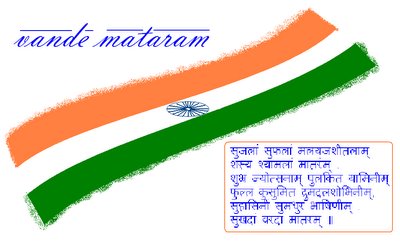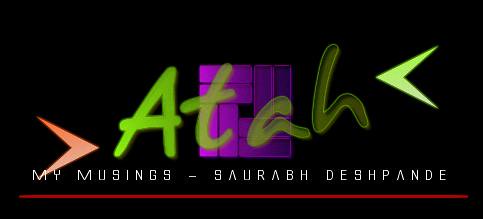Vande Mataram
 Vande Mataram - A hundred years, a hundred tunes!!
Vande Mataram - A hundred years, a hundred tunes!!
Written by "Akshay Navami" Bankimchandra Chatterjee" in 1875, Vande Mataram is more than a Hundred years old. Around 1870, the British rulers were trying hard to force their anthem, God Save the Queen, on Indians. This made a deep impact on Bankimchandra’s sensitive mind, and he wrote Vande Mataram in one sitting, in a mood that must be called transcendental. He wrote the song as a prayer in which the nation 'Bharat' was described as 'The Mother'. The song was later included in his novel Anandmath, which was published serially in his magazine Bangdarshan during 1880-1882.
The song remained in the novel Anandmath until it was sung by Rabindranath Tagore at Beadon Square in the 1896 convention of the Indian National Congress. It soon became part of a tradition after that. In 1905, large crowd gathered at a town hall in Calcutta to protest against the partition of Bengal, and someone from the crowd shouted Vande Mataram. It became a very popular slogan overnight. It crossed the boundaries of Bengal and spread all over the country like a flame. Soon the British administration banned the songs and the very slogan Vande Mataram.
Unfortunately this great song has been bereft with controversy. Why do Muslims object to singing of Vande Mataram? What does Vande Mataram have that hurts their sentiments? Vande Mataram as we know it is not the complete song. Originally it has 5 stanzas. In the following stanzas, the song praises the motherland as godess Kali, Durga and Laxmi. It is this equation of the country with Hindu goddesses that seems to irk some of the muslims. From the early 30's itself only the first two stanzas of Vande Mataram are sung. In all the texts subsequently only this abridged version is written. I guess not many of this generation even know about the rest of the stanzas of Vande Mataram. In light of this, I don't think muslims or anyone else should consider Vande Mataram to hurt their sentiments. It is our national song; we should take pride in singing it. It has a legacy, a legacy of hundreds of people, Hindus and Muslims, who have laid their lives hand in hand shouting this slogan. It is a mantra which has given us our freedom.
The following is the English translation of Vande Mataram by Sri Aurbindo:
Rich with thy hurrying streams,
bright with orchard gleams,
Cool with thy winds of delight,
Green fields waving Mother of might,
Mother free.
Glory of moonlight dreams,
Over thy branches and lordly streams,
Clad in thy blossoming trees,
Mother, giver of ease
Laughing low and sweet!
Mother I kiss thy feet,
Speaker sweet and low!
Mother, to thee I bow.
I feel proud when I hear this song. I feel humble when I hear this song. I feel respectful when I hear this song. Vande Mataram !

